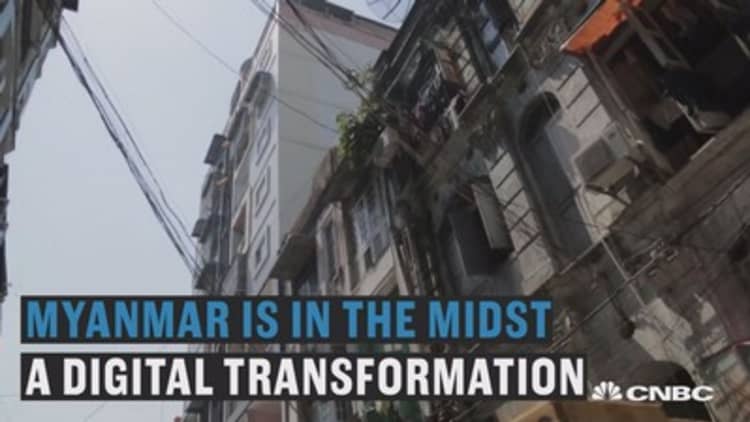
YANGON, Myanmar — Honey Mya Win didn't have to look far to discover the tech potential for Myanmar. A 26-year-old former telecom engineer at Huawei, she was directly involved in configuring mobile phone towers and base station controllers that expanded 3G access to the once reclusive nation.
"My team was actually the one connecting the country," she said. "That made me think: Maybe I should get in on this internet business."
That was a few years ago — when mobile penetration was still hovering at single digits in Myanmar.
Today, more than 80 percent of the population is digitally connected through smartphones, according to Hootsuite. For her part, Win has traded in the engineering job to start an online freelancing platform, Chate Sat.
"In two or three years, I've seen a huge improvement," Win said. "Before, it was one mobile operator. Now, we have like three or four. That's led to a huge boom in tech-related opportunities for us."
Investors are taking note. At the country's first Demo Day, hosted by accelerator Phandeeyar in Yangon earlier this month, more than 200 people including foreign VCs showed up to hear Win and three other start-ups give their pitches. The presentations, the culmination of a rigorous six-month training program aimed at helping young entrepreneurs materialize their ideas.
Phandeeyar Director Jes Kaliebe Petersen said 80 startups applied for the program last fall.
"There is definitely a sense of hunger to get access to data and technology, and data and information — maybe precisely because the country was so closed off before," Petersen said.
That digital transformation began in 2011 after the military ceded power to a civilian-led government, opening the country to the outside world. In 2014, the government granted telecom licenses to Qatar's Ooreedo and Norwegian telecom operator Telenor, drastically slashing the price of data usage. The cost of SIM cards went from $200 to $1.50 overnight.
"When they launched, everybody went straight to 3G," said Genevieve Heng, Director at Anthem Asia, a Myanmar-based investment group. "Suddenly everybody was on Facebook. Everybody was connected to the rest of the world."
Social media platforms like Facebook have capitalized on the rapidly growing user base by teaming up with telecom companies to offer some features on their sites without any data charges. Those like Japanese messaging platform Line have utilized the partnership to help operators develop apps, while also assisting with customer support. The number of active social media users now tops 14 million, or a quarter of the population. That's a rapid jump considering few in the country even knew about Facebook as recently as 2012.
Mike Than Tun Win, who moved from Singapore to start investment firm BOD Tech, said social media has become the most popular form of entertainment in a country with few entertainment options.
"Many people didn't have TVs or phone lines before — even DVD players," he said. "The smartphone has become their TV, their tablet, their computer."
Phandeeyar is laying the ground work for the next phase in Myanmar's digital revolution: fostering homegrown startups. At its sprawling office in downtown Yangon, Petersen and founder David Madden help young entrepreneurs connect with established mentors to learn the fundamentals of operating a business.
Since hosting its first hackathon "Code for Change Myanmar" in 2014, Phandeeyar, which means "creation place" in Burmese, has become the epicenter of the country's evolving tech scene, giving local talent valuable exposure to an international pool of investors.
Phandeeyar's success has attracted some big tech names to the innovation hub itself.
Last year, the group received a $2 million tech grant from Omidyar Network, the philanthropic investment fund of E-bay founder Pierre Omidyar. The Schmidt Family Foundation, started by Eric Schmidt, the executive chairman of Google's parent company Alphabet, has also contributed to Phandeeyar.
While Myanmar's tech scene may be attracting more attention, foreign investments into the country have slowed down broadly because of uncertainty over economic reforms. An updated corporate law that would allow investors to hold a larger stake in existing domestic companies has yet to be enacted. Political tensions in the Rakhine State and clashes at the Chinese border have also scared off some investors.
Infrastructure remains a challenge as well. Just one-third of the population has access to the electricity grid, according to the World Bank, while a majority still do not have access to bank accounts.
That hasn't discouraged Heng, who has already invested in nine businesses here. She points to Myanmar's strategic location as a key reason to stay.
"Before the military government took over, and the country went into what I like to call the Rip Van Winkle era, (Myanmar) was one of the leading countries in Asia," she said. "They had natural resources, a reasonable population. We see it as a great place to invest."


